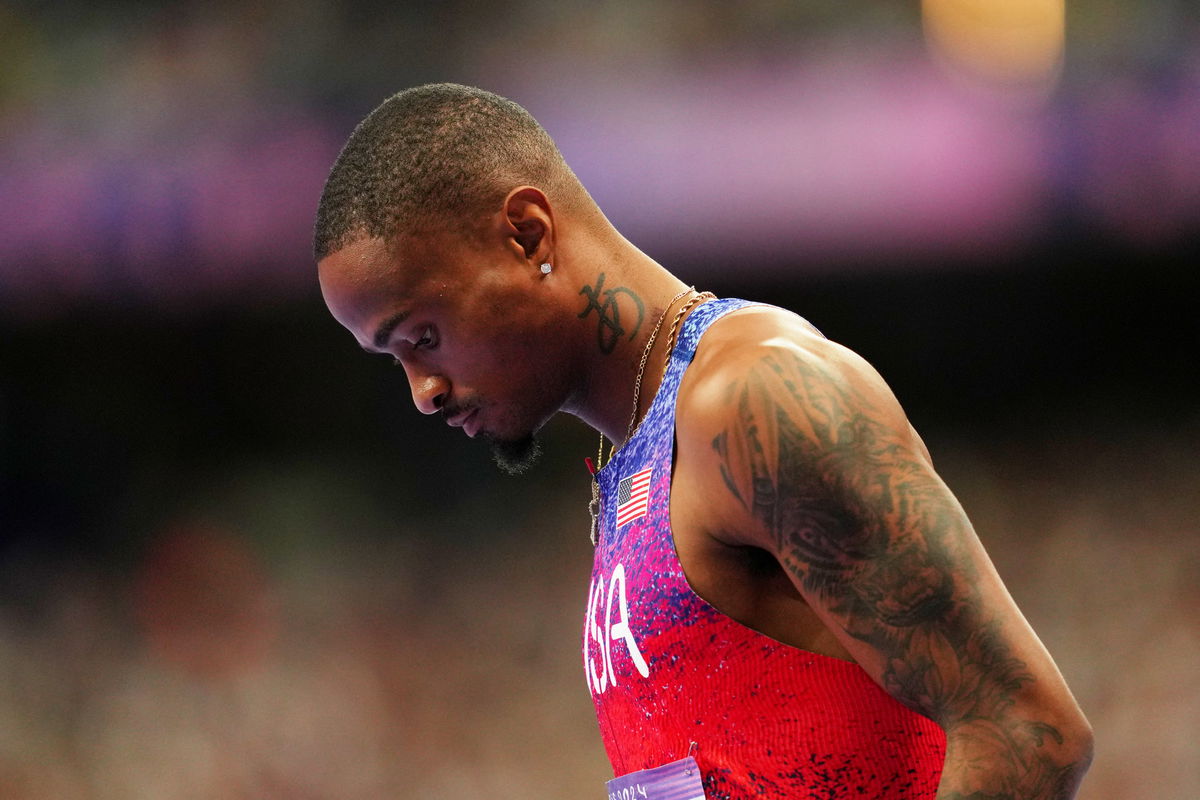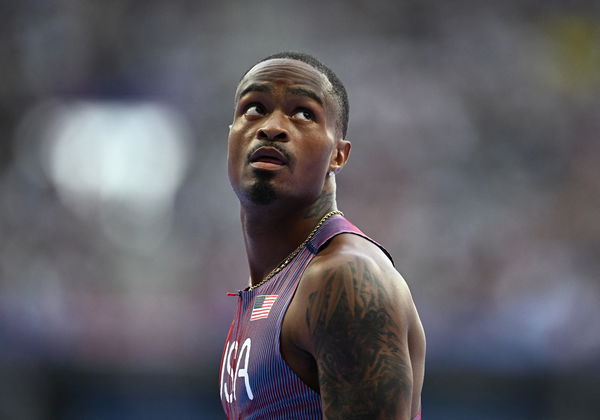
Reuters
Paris 2024 Olympics – Athletics – Men’s 400m Final – Stade de France, Saint-Denis, France – August 07, 2024. Quincy Hall of United States before the race. REUTERS/Aleksandra Szmigiel

Reuters
Paris 2024 Olympics – Athletics – Men’s 400m Final – Stade de France, Saint-Denis, France – August 07, 2024. Quincy Hall of United States before the race. REUTERS/Aleksandra Szmigiel
Just a month ago, Quincy Hall stood atop the world, legs stretched with triumph across the finish line in Paris. Hall, who had electrified the Stade de France with a 43.40-second finish, had edged past Matthew Hudson-Smith in the final few meters of a race that seemed destined for the British veteran. That time marked not only a personal best but also the second-fastest ever in Olympic history, trailing only Wayde van Niekerk’s enduring record. Analysts, fans, and competitors had taken note. Hall had arrived. But the brilliance of that evening has since been clouded by recurring absences. And now, it looks like Hall has a new foe to deal with. Surprisingly, it comes from within him!
Watch What’s Trending Now!
In a baffling twist, the world’s top-ranked 400-meter runner has quietly stepped away from yet another high-profile meet. Spectators had prepared to witness a statement performance at the Prefontaine Classic. Instead, they were left parsing a grainy screenshot and a caption that offered more uncertainty than clarity. Hall’s sudden decision to withdraw from the 400-meter event at the Prefontaine Classic, announced on July 5, left the track world reeling.
ADVERTISEMENT
The news broke through social media, not from a press release or governing body, but via a screen-captured Instagram story shared by track analyst Travis Miller. In the post, Hall wrote, “Hate to say but I won’t be running due to a injury but I’ll be back go head get the proper treatment I need. Good luck to all the athletes running.” The phrasing was informal, the message succinct, and the tone. Resigned. Crucially, no details have been released about the nature or severity of the injury.
🇺🇸Quincy Hall announces he will not compete at the Pre Classic due to an injury.
(via: Quincy Hall/IG) pic.twitter.com/BUpICJFz0Y
— Travis Miller (@travismillerx13) July 4, 2025
ADVERTISEMENT
Now, this is not Hall’s first withdrawal. He had already missed the Grand Slam Track meet in Miami, citing injury concerns. His absence from the Prefontaine Classic marks a second major scratch in just a few weeks. With the Worlds looming and form as vital as ever, questions are beginning to circulate. Not just about fitness, but about timing, readiness, and communication. Hall’s team has remained notably silent, offering no additional context or prognosis. What remains clear is this. In a year when Quincy Hall was expected to consolidate his place in the history books, his biggest challenge now may not be the clock, but time itself. Meanwhile, Hall had some more upsets this year owing to his frustrating injuries.
ADVERTISEMENT
Quincy Hall backed out of Grand Slam Track, then barely held on in Rome
Quincy Hall’s decision to step away from Grand Slam Track has, in many ways, brought into focus the precise tensions that exist between ambition and structure in elite track and field. Signed last October as one of the faces of GST’s ambitious reboot, Hall was expected to anchor the 200/400m group. But when the meet fields were finalized last week, his name was missing. In his place stood 2019 world champion Steven Gardiner. The public explanation, posted by Hall himself, cited only “some circumstances.” His agent, John Regis, later clarified, “It made more sense for him to focus on the 400m event, which is what he’s renowned for.”

Reuters
Paris 2024 Olympics – Athletics – Men’s 400m Round 1 – Stade de France, Saint-Denis, France – August 04, 2024. Quincy Hall of United States looks up ahead of heat 4 REUTERS/Dylan Martinez
The explanation, while direct, leaves little doubt that Hall’s withdrawal was not due to injury. He had already been announced for the Diamond League meet in Keqiao and, just days ago, contested the 400m in Rome. That race, however, provided little vindication. Hall won, narrowly, in 44.22 seconds, his fastest of the season, yet achieved only by overtaking South Africa’s Zakithi Nene in the final strides. Hall’s own verdict after the race was quiet but telling. He stated, “It is coming down. You do not know about the time, but it is coming down this year.” There was no mention of Grand Slam Track, no signal of return.
ADVERTISEMENT
In truth, Hall’s reluctance mirrors that of several top athletes, including fellow Regis client Grant Holloway, who declined GST altogether. Holloway, a high-volume competitor by any standard, still found the required doubling incompatible with his rhythm-based discipline. “When he’s ready to branch out and do other events, he’ll notify us,” Regis said. For Hall, as for Holloway, the calculus appears simple. That not every format suits every athlete, regardless of paycheck or prestige.
ADVERTISEMENT
ADVERTISEMENT
ADVERTISEMENT
ADVERTISEMENT